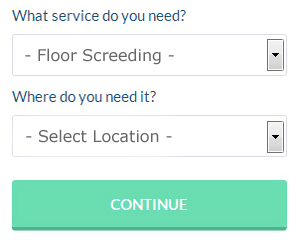Floor Screeding Plymouth Devon (PL1): A professional floor screeding company can level a damaged or uneven floor, help to install underfloor heating or help with renovations on your Plymouth property, when needed. Before you can lay a suitable floor covering, be it carpet, tile or wood, the surface of the floor should be as flat as is possible; this is why floor screeding is sometimes needed. If you want your floors to last then a floor screed is one of the most important factors in any renovation or building task.
FLOOR SCREEDING COMPANIES PLYMOUTH
A dependable screeding contractor in Plymouth will have all the experience and know-how to help you achieve a perfectly finished floor in whichever shape or size of room you're working on. They'll be able to advise you on the right type of screed that your project requires, and the best methods for applying and installing it.
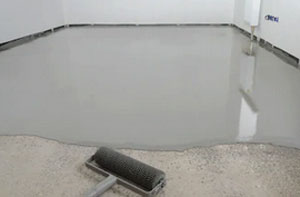
The screeding specialist will also tell you if a structural engineer is needed for your project, to identify flex strength, load requirements and point loadings that your screed floor may need to conform with current British Standards and building regulations.
The training and skills that a qualified screeding contractor brings to your project should guarantee a successful result and help in prolonging the lifespan of your floor. A correct mix of screed and the way it is laid is also crucial to ensure the ultimate durability of your floor.
There are a number of screeding specialists in the Plymouth area so see if you can get multiple quotations for your project before picking a company and know to what standard of finish is it for. The SR (Surface Regularity) finish is the number to look for when reviewing a quotation from your Plymouth screeding contractor. SR1 is the highest standard, and whilst SR2 and SR3 might be cheaper at first glance, they do not guarantee a perfectly flat or even floor surface. This means you may have to correct any patches that may cause problems when laying your finished flooring material.
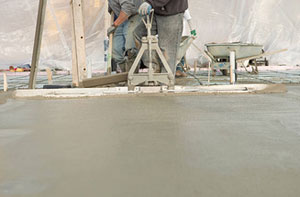
British Standards BS8204 lays out the regulations and guidelines that all Plymouth screeding installers are required to follow, and if working with specialist screeding solutions, (Cemfloor, Flowcrete, Gypsol etc), they must be certified by the manufacturers as being skilled and trained in their use. The training and testing of a screeding company by such manufacturers is emphasised by the use of the accreditation scheme, and offers assurances of reliability and safe working practices on any flooring project involving their materials.
Plymouth commercial screeders will be involved in the screeding of floors in schools, hospitals, restaurants, factories, warehouses and shops.
TYPES OF SCREED
Standard Screeds - A combination of sand and cement which is acceptable for normal residential use. The ratios involved are 5 parts sand to 1 part cement. After laying a standard flooring screed sets at a rate of 1mm/day.
Industrial and Heavy Duty Screed - Where levels of traffic are high or heavy loading on the floor is required, heavy duty screeds deliver maximum strength and durability.
Self-Levelling or Liquid Screeds - A cement and latex solution which can achieve the highest standard SR1 finish. Mainly used to finalise a damaged floor or poor substrate level to enable the laying of a new flooring surface, such as tiles on the top of it. Even with a depth of only 1mm, the latex polymers within the screed provide a high strength surface for a wide range of uses.
Fibre Reinforced Screed - Mostly used with under floor heating and is the recommended choice in these projects. This is because of the increased strength and protection against thermal shrinkage and cracking provided by the fibres within the screed mix. It's got a drying rate of one millimetre per day.
Polymer Screeds - When a decreased thickness of floor is required due to building factors, a polymer screed provides a high strength resolution to this problem. Owing to their different chemical compositions, these screeds have varying drying times which can be verified by studying manufacturer's guidelines.
Fast Drying and Advanced Drying Screeds - If there is a need to use the area in question ASAP a fast drying screed can be employed. They are generally a fibre reinforced type of screed which can dry at a rate of between three and seven millimetres per day and are employed in time-sensitive flooring projects.
SCREEDING PREPARATION AND INSTALLATION
To ensure that the screeding is of a high quality finish that is durable and hard wearing, time should be devoted to preparing the area before any screed is poured. The existing floor surface should be thoroughly cleaned to remove any paint, oil, grease and debris which might adversely affect the bond of the screeding.
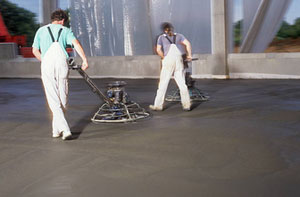
Any cleaning chemicals which are used during this process shouldn't leave any residues, and the floor base must be allowed to dry by itself naturally. At this point any cracks need to be repaired because these can travel up through your laid screed and be reflected in the completed floor surface. During an on-site survey the screeding contractor will notice what preparations are needed before any actual screeding work begins.
To shield the screeding layer and flooring materials from moisture rising up through the ground, a damp proof membrane (DPM) must be laid. Different thicknesses of specialised polythene could be used as a DPM and also act as a buffer for the screed and any insulation material.
If your home is located in a place where radon gas is present an extra barrier layer is required to prevent radon gas from entering. If radon gas occurs in large amounts then a complete ventilation and extraction system may be installed under the screed which will extract any gases that are seeping in from ground level.
Once the base has been prepared and any membranes installed, a primer or sealer is then put on. A primer helps with the screed bonding correctly to the base surface and different varieties exist depending on which kind of screed is being applied. Custom-made equipment such as airless sprays will usually be used to apply a sealant or primer, by qualified screeding contractors in Plymouth sticking to the manufacturer's guidelines.
Before the screeding can be laid, any underfloor heating (if required) will now set out and installed. Insulation panels can be arranged and the cables and heating pipes will be firmly fastened to prevent any movement whilst the screed is being poured. Under floor heating is one of the most effective ways to heat a room and a professionally installed system will give an even warmth all over the floor.
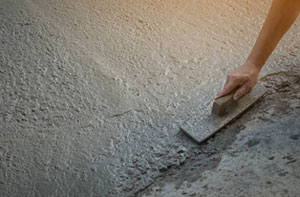
The screeding can now be prepared in situ and spread onto the base. The specific requirements of the room will dictate the form of screeding that is used. For quick drying and advanced screeds there will be at least twenty four hours delay before it can be walked over, and a further 3 days minimum before any flooring material can be fitted. If you are laying heavy duty or standard screeds the setting time is longer and the manufacturer's guidelines must be adhered to in order to get the best finish for your floor.
You can test the SR level of the finished screed once it is solidified enough to walk on. Using a 2 metre straight-edge the floor surface is checked for any deviations, dips and ridges in the screed surface.
- SR1 - Over the entire screed area, if there are no disparities greater than three millimetres from the straight-edge, you've got a top quality SR1 specification surface.
- SR2 - The standard flooring in commercial and industrial builds is classed as SR2 and has a maximum possible deviation of 5 millimetres across the whole screeded surface.
- SR3 - For utility floors where the quality of finish is relatively unimportant the SR3 is the classification and has a deviation measurement of ten millimetres or less.
If your screed floor has been laid with particular load bearing requirements in mind then a qualified structural engineer is going to be necessary to perform the assessment. This assessment will establish the strength of the screed surface and the suitability for its proposed use. The screeding could be subjected to a "drop hammer test" to assess flexibility and strength in specific areas. Only experienced structural engineers respecting the British Standards BS8204 regulations are permitted to perform such testing and sign off on the structural safety of a screed floor. (Tags: Floor Screeding Plymouth, Floor Screed Plymouth, Floor Screeding Services Plymouth, Screeding Plymouth).
Screeding services are available in Plymouth and also in: Peverell, North Prospect, Bickleigh, Hartley, Torpoint, Pomphey, Camels Head, Devonport, Estover, Keyham, Derriford, Home Park, Mutley, Wembury, Plym Bridge, Lipson, and in these postcodes PL1 1PQ, PL1 1HY, PL1 1DG, PL1 1QH, PL1 1PB, PL1 2LE, PL1 1HZ, PL1 1DE, PL1 1UH, and PL1 2LQ. Local Plymouth floor screeders will most likely have the postcode PL1 and the telephone code 01752. Checking this out can ensure that you access locally based floor screeding. Plymouth property owners can benefit from these and many other related services. If you wish to get a quote for floor screeding services, you can easily do so by clicking on the "Quote" banner.
Latex Floor Screed Plymouth
When the surface of a floor needs a certain degree of flexibility, it might be wise to use a latex floor screed. Usually coming in two parts, latex screeds comprise a cementitious powder and a liquid latex mixture. The liquid latex solution takes the place of the water that's used in normal screeds, meaning it is quicker drying and more flexible.
Used in the levelling-out of sub-floors, this latex compound creates a surface for the installation of your chosen floor finish. Suitable for sub-floors of asphalt, concrete, sand/cement, stone tiles and wood, this gives the ideal surface for the application of adhesives that's smooth and durable. This type of latex floor screed will give you a crack-free, flexible finish, even if there's movement in your subfloor.
With a "floating" screed, for example when an unbonded screed is being laid over a layer of thermal or acoustic insulation, latex flooring screeds won't be a suitable choice. Floating screeds with a depth of 50 to 75 millimetres are generally used over underfloor heating.
Related Tasks

There is a range of work that can be carried out by your local Plymouth floor screeding company including quick-dry screeds in Plymouth, bonded concrete screeding Plymouth, bonded screed, acoustic flooring, polished screed flooring, floating screed, screed flooring, office floor screeding, floor screeding, floor screeding tools, concrete screeds in Plymouth, fibre reinforced floor screeding, final floor finishes, shop floor screeding, floor repairs in Plymouth, garage screeding, unbonded screed, floor screeding estimates, waterproof screeding, screed repairs, floor insulation, underfloor heating screed Plymouth, residential floor screeding Plymouth, anhydrite screed in Plymouth, granolithic floor screeding, and more floor screeding tasks. These are just a selection of the tasks that are handled by people specialising in floor screeding. Plymouth companies will be delighted to keep you abreast of their whole range of services.
The Tools That You Will Need For Screeding a Floor
- Knee Protectors
- Measure
- Spirit Level
- Straight Edge
- Trowel
- Gloves
- Float
- Buckets
- Dappling Bar
- Floor Profile
- Spade
Floor Screeding Near Plymouth
Also find: Hartley floor screeding, Home Park floor screeding, Pomphey floor screeding, Peverell floor screeding, Camels Head floor screeding, Plym Bridge floor screeding, Torpoint floor screeding, Lipson floor screeding, Devonport floor screeding, Estover floor screeding, Derriford floor screeding, Wembury floor screeding, North Prospect floor screeding, Keyham floor screeding, Bickleigh floor screeding, Mutley floor screeding and more. All of these towns and villages are covered by companies who do screeding. These professionals, with their necessary know-how and expertise, excel in providing top-quality floor screeding solutions. Screeding is an art that they've mastered, ensuring that the task is executed to the highest standards, whether it’s for residential or commercial properties. By simply clicking here, local home and property owners can obtain screeding quotations.
Floor Screeding Services Plymouth
- Plymouth Floor Screeding
- Plymouth Fast-Dry Screeding
- Plymouth Industrial Floor Screeding
- Plymouth Polished Screed Floors
- Plymouth Cheap Screeding
- Plymouth Screed Calculator Service
- Plymouth Floor Damp Proofing
- Plymouth Floor Screeding Advice
- Plymouth Fibre Reinforced Screeding
- Plymouth Floor Insulation
- Plymouth Floor Levelling
- Plymouth Liquid Screeds
- Plymouth Underfloor Heating Installations
- Plymouth Domestic Screeding
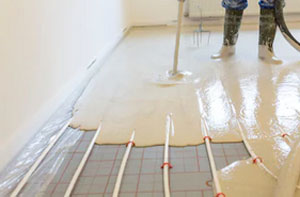 Floor Screeding Plymouth
Floor Screeding Plymouth Screeding Near Me
Screeding Near Me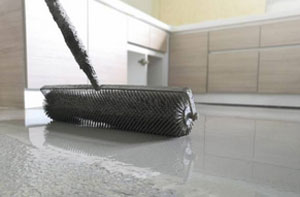 Floor Screeders Plymouth
Floor Screeders PlymouthScreeding Jobs Plymouth: See screeding jobs in Plymouth here: Screeding Jobs Plymouth
If you're interested in local information relating to Plymouth, Devon check here
More: Floor Levelling, Decorative Screeding, Polished Screeding, Decorative Screeding, Screeding Specialists, Screeding Specialists, Floor Screeders, Cheap Floor Screeding, Screeding Specialists, Screed Reinforcement, Polished Screeding, Flooring Contractors, Floor Levelling, Decorative Screeding, Screed Flooring, Polished Screeding, Floor Levelling Services, Screeding, Cheap Screeding, Floor Levelling, Commercial Screeding, Screeding, Coloured Screeding, Floor Levelling Services, Polished Screeding, Screeding Contractors, Screeding Specialists, Screeding Companies, Screeding Contractors, Cheap Screeding, Residential Screeding, Floor Screeding, Screed Flooring, Coloured Screeding, Driveways, Concrete Driveway Specialists, Driveway Installation.
Floor screeding in PL1 area, (dialling code 01752).
TOP - Floor Screeding Plymouth
Screeding Services Plymouth - Underfloor Heating Plymouth - Domestic Screeding Plymouth - Floor Screeding Plymouth - Self-Levelling Screeding Plymouth - Commercial Screeding Plymouth - Screeding Plymouth - 01752 - Floor Levelling Plymouth




